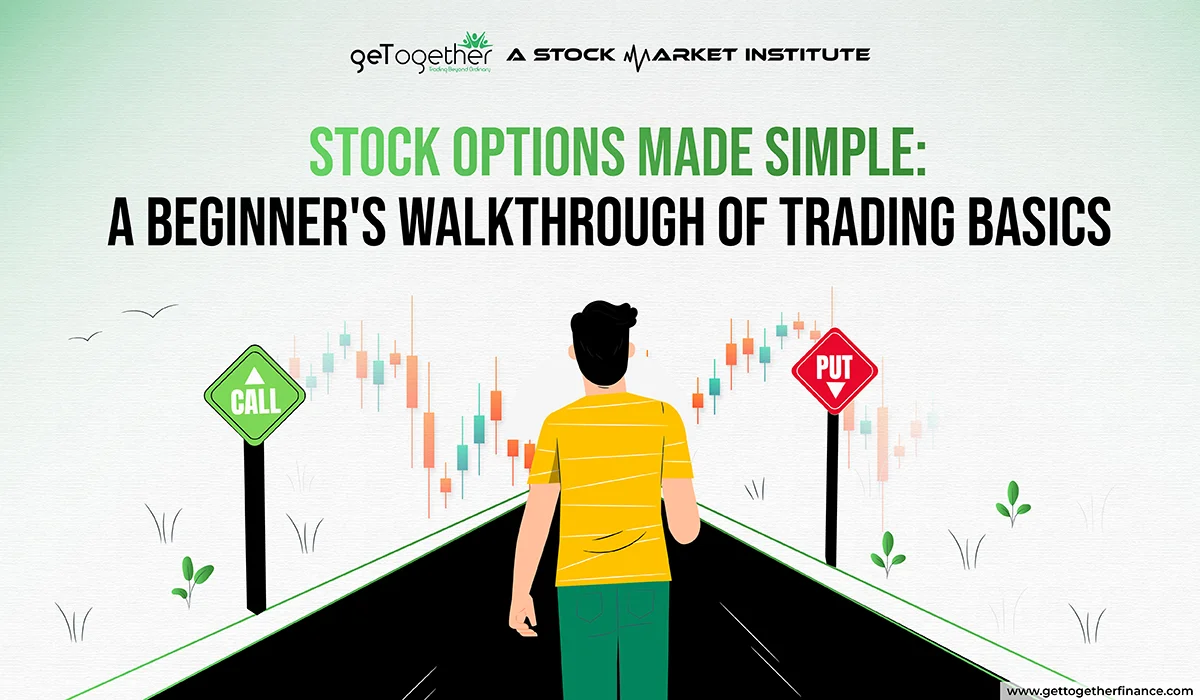Stock Options Made Simple: A Beginner’s Walkthrough of Trading Basics


Are you new to the stock market? If so, you must have heard of one of the most popular investment tools – stock options trading. This financial instrument has gained significant traction as it enables investors and traders to diversify their portfolios.
While stock options trading yields considerable profits, investors can end up enduring huge losses if not understood properly. A SEBI report found that 9 of 10 individual traders incurred net losses during FY19-FY22. The average stood at ₹1.1 lakhs during FY22.
This article will discuss the fundamentals of buying options in stock markets and delve into investing jargon around it.
Table of Contents
ToggleWhat is Stock Options Trading?

Stock options trading involves buying and selling options contracts. These contracts are associated with an underlying asset, and allow investors to trade a certain volume of that asset at a particular price during a particular date.
The pre-negotiated price is called the strike/exercise price, and the amount you pay upfront for any stock option is called the premium. Additionally, the predetermined deadline on or before which you can trade these assets is called the expiration/maturity date.
The best part about stock options trading is that you do not have to buy or sell assets compulsorily. Instead, it offers you the “right” to trade stock option contracts.
How Does Stock Options Trading Work?

As you dip your toes into options in stock markets, you will find two primary types of stock options: Call options and Put options.
Call Options
A call option lets you purchase stock option contracts at the strike price until the expiration date. Its value increases as the underlying stock price increases. Hence, call options are useful when the markets are bullish. Alternatively, you can sell a call options contract if you reckon the stock price will decline or does not show much movement.
Let’s say ABC’s stock is currently trading at ₹100/share, but you believe it will soar to ₹130/share in the following three months. So, you buy 100 call option contracts for ABC with a strike price of ₹110/share and a maturity date three months from now. To exercise the contract, you only pay a premium of ₹10/share to the person selling them.
If ABC’s stock price surpasses ₹130 within the next three months as expected, you can buy the stock at the lower ₹110 strike price, even though the market price is ₹130. You can then sell the stock immediately at that market price and earn a profit of ₹130-₹110-₹10 = ₹10/share.
Now if ABC’s stock price stays below ₹110, you do not have to use the call option; instead, you only lose the option premium you initially paid, i.e., ₹1000.
Put Options
A put option lets you sell stock option contracts at the strike price until the expiration date. Its value increases as the underlying stock price decreases. Hence, call options are useful when the markets are bearish. Alternatively, you can buy a put options contract if you believe the stock price will increase or does not show much movement.
Let’s say ABC’s stock is trading at ₹100. You think it is overvalued and will drop to ₹75 in the next three months. So, you buy a put option contract with a ₹90/share strike price and a three-month expiration. To exercise the contract, you only pay an option premium of ₹10/share.
If ABC’s stock price drops below ₹75 as you wished, you can sell the stock at the higher ₹90/share strike price, even though the current market price is lower. You can then sell the stock at the higher ₹90 strike price and earn a profit of ₹90-₹75-₹5 = ₹10/share.
If ABC’s stock price remains above ₹75, you do not have to use the put option; instead, you only lose the option premium.
Benefits of Buying Options in Stock Markets
While stock options trading is slightly more complex than stock trading, you can lock in relatively bigger profits if the asset price goes up. That is because you do not have to pay the entire price for the stock in an options contract.
Similarly, stock options trading can reduce your losses if the stock price tilts in the opposite direction than expected for either a put or call. In such cases, you should let the options contract expire. That way, your losses are equal to the premium plus the associated trading fees.
Also Read: Bearish Options Strategies
Things to Know Before Buying Options in Stock Market

Before picking stocks for options trading, there are multiple factors to consider:
Multiple Expiration Dates
India runs one of the world’s most complex and extensive options markets. In the spot market alone, there are 188 different trading options available, including complex contracts like iron condors, short saddles, and calendar spread. Hence, finding an options contract that suits your needs is relatively seamless.
Intrinsic Value
Intrinsic value is a stock’s worth that is irrelevant to its current market price. Future earnings from the put option, estimated using an options payoff chart, determine an option’s intrinsic value.
Time Value
Time value is the rate of increase of an option’s price as time passes. A call option has more time value than a put option. That is because buyers of a call have more time before they purchase something at the strike price. As such, they have more time to realize their profits from exercising their option before any expiration date rolls around again.
Volatility
Stock options trading is more volatile than traditional stock trading. Indeed, experts reckon that profit potential is maximum in high-volatile stocks.
Stock options trading is ideal for traders who look to stand out by profiting from unpredictable events, such as economic swings or global trends that could trigger price fluctuations until their expiry.
Risk Tolerance
Generally, investors with deep pockets and a high-risk appetite buy/sell stock options. Moreover, this investment strategy involves short-to-medium-term gains. The reduced time window increases the uncertainty pertaining to stock options trading.
Every option strategy has a clear-cut risk/reward profile, so understand it properly. Avoid overcommitting and manage risk through diversification and position sizing.
Trade Stock Options With Confidence
While stock options trading seems quite straightforward and offers greater profit margins, you can slip into trouble if you are a rookie investor. As with any other investment options, better understand what type of stock option you are purchasing. You could lose your hard-earned money if your thesis turns sour.
If possible, use online simulators to get a gist of how stock options trading works before trying the real deal. Whenever you are ready, start small – you can always try more aggressive stock options strategies down the lane. Initially, better focus on some stocks you know well and wager an amount you are comfortable losing.
FAQs
What is futures and options in stock market?
Futures and options (F&O) are two stock market derivatives where traders/investors buy and sell shares at a predetermined price. Shareholders book their profits or incur losses as per their speculation when trading F&Os. While both futures and options are derivatives, they have distinct characteristics.
Future contracts obligate traders to buy and sell shares, while options contracts do not come with such obligations. Traders must execute futures trading at the decided date of the contract only, while they can exercise options contracts anytime within the specified date. Furthermore, options contracts charge a premium to traders, while there is no entry fee to exercise futures contracts.
What is options selling in stock market?
Options selling strategy involves writing (selling) options contracts of stocks at a pre-decided price on a fixed date. Traders sell call options contracts when they believe the share price will not surpass the strike price before the option’s expiration date. Contrarily, they sell put options contracts believing the share price will not drop below the strike price before the option’s expiration date.
How to select stocks for options trading?
Follow these tips to pick the best stocks for options trading:
1. Choose highly liquid stocks, meaning they have active options markets with tight bid-ask spreads.
2. Volatile stocks have higher options premiums, leading to more significant potential returns.
3. Study the share’s price chart and technical indicators to identify trends, support/resistance levels, and potential entry/exit points.
4. Understand the option Greeks, such as Delta, Gamma, Theta, and Vega, to analyze how changes in the share’s price, time decay, and volatility affect your options positions.
Do stock options expire?
Yes, stock options do have expiration dates. An expiration date is the last day traders can exercise options contracts. After this time frame, the options contract carries no value, and its rights and obligations cease to exist.
In India, monthly options contracts expire on the last Friday of the month after the closing bell. Weekly options expire every Friday. If the expiry date coincides with a bank/market holiday, the contracts expire a day before the original date.
What is options trading in stock market?
Options trading involves buying and selling financial contracts called options. Options are stock derivatives that empower offer traders to sell (put option) or buy (call option) shares at a preset price (strike price) until it reaches a specified expiration date.
What does it mean to exercise stock options?
Exercising stock options means traders are leveraging their right to purchase (call options) or sell (put options) shares of the stock at the strike price specified in the options contract.
What is exercise price of stock options?
The exercise price of a stock option, also called the strike price, is the predetermined price at which traders buy/sell shares of the stock. In terms of call options, the exercise price is the price at which traders buy shares. Contrarily, in terms of put options, the exercise price is the price at which options traders sell the underlying shares.
Are company stock options taxable?
Company stock options or ESOPs are subject to taxation at various stages, including when they are granted, vested, and exercised. The tax treatment of ESOPs is complex and depends on several factors, such as the type of ESOP, the employee’s tax residency status, and the specific provisions of the Income Tax Act 1961.
Besides, any capital gains arising from selling shares purchased through ESOPs are subject to capital gains tax. For instance, if employees sell the shares within one year (two years in case of unlisted stocks) of the exercise date, they attract short-term capital gains tax at their applicable tax rate.
Can you sell a call option without owning the stock?
You can sell a call option without owning the underlying stock. This strategy is called a naked short call. The potential profit from a naked short call is limited to the premium received when selling the call option. However, the risk is theoretically unlimited. If the stock price rises significantly, the trader may face substantial losses when buying its shares at the higher market price to fulfill their obligation.
Is it better to take RSU or stock options?
Restricted stock units (RSU) and stock options (ESOP) have their own pros and cons. For instance, for RSUs, employees do not have to buy shares at the exercise price, which is the case with ESOPs. They become shareholders immediately when they get RSUs and may enjoy dividends and voting rights.
However, RSUs deliver lesser returns than ESOPs. That is because employees buy stock options at a lower strike. So, if the stock price increases significantly, the potential for profit can be substantial.
What is vested stock option?
A vested stock option is an ESOP that has reached a point where the employee has met the necessary requirements to exercise the option and acquire the underlying shares of stock. Companies offer their employees a guarantee that if they work for an agreed period, they will earn assets like equity stocks. Employees do not get all of their options right when they join a company, Instead, the options vest gradually, over time, called the vesting period.
How are stock options priced?
Stock options are priced using various pricing models, with the Black-Scholes Model being the most commonly used. This model, along with variations and adaptations, helps determine the theoretical value of stock options. The pricing of stock options is a complex process that considers several key factors, including strike price, current stock price, time to expiration, volatility, and risk-free interest rate.
How to select option stock?
Choose high-liquidity and volatile stocks. While options on liquid stocks have tighter bid-ask spreads, higher volatility often leads to more significant price swings.
What happens to options if a stock is delisted?
When a stock is delisted, options traders can trade it on another exchange or the over-the-counter (OTC) market. Besides, traders will be refunded the cash value of the option upon expiration if the underlying stock gets delisted.
If the stock is delisted and options remain unexercised, the options will generally expire according to their original expiration dates. Unexercised options eventually become worthless at expiration.
What is a cliff period on stock options?
A cliff period is a specific vesting schedule for employee stock options. In a cliff vesting schedule, employees do not gain any ownership rights or become eligible to exercise any portion of their stock options until they work for the company for a specific. After the cliff period, they can exercise all of the options granted to them initially to acquire the underlying shares of the company’s stock.
What is a stock option grant?
A stock option grant is a type of employee compensation or incentive scheme for companies’ employees and C-level executives. These stock options enable them to buy a particular quantity of shares of the company’s stock at a predetermined price (strike price) within a specified period (vesting period).
What is IV in stock options?
Implied volatility (IV) measures how volatile a stock’s price will be in the near future. It is critical to determine the value of options. Higher IV results in higher option premiums (prices) and vice versa.
Where do stock options come from?
Stock options are actively traded on Indian stock exchanges, primarily the National Stock Exchange (NSE) and the Bombay Stock Exchange (BSE). Additionally, many Indian companies offer employee stock option (ESOP) plans as a form of compensation to their employees. Further, exchange-traded funds (ETF) often have options contracts associated with them. These options enable traders to speculate on the performance of the ETF’s underlying index.
How to calculate stock option value?
The value of a stock option is determined by combining various factors, including the current stock price, the option’s strike price, time remaining until expiration, implied volatility, and interest rates. Two common methods for calculating the value of stock options are the Black-Scholes model and the Binomial model.
How to pick stocks for options trading?
Firstly, focus on high-liquidity stocks. Liquidity ensures there are active options markets with tight bid-ask spreads, making it easier to enter and exit positions at favorable prices. Secondly, consider stocks with high price volatility as it results in higher options premiums, potentially offering more significant trading opportunities. Thirdly, study the stock’s price chart and identify trends, support/resistance levels, and potential entry/exit points. Lastly, use option Greeks to determine how stock price, time, and volatility changes may impact your options positions.
How to trade stock options?
Follow these steps to understand trading stock options:
1. Learn key concepts, including call and put options, strike prices, expiration dates, and options premiums.
2. Open a trading account with a brokerage company providing options trading services.
3. Determine your risk tolerance and trading goals.
4. Consider factors like liquidity, implied volatility, and market conditions while choosing suitable options contracts.
5. Create a trading strategy with clear entry/exit points and risk management guidelines.
6. Specify whether you are buying (going long) or selling (writing) options contracts.
7. After executing trades, review your performance, analyze your trading decisions, and learn from your successes and mistakes.



 Facebook
Facebook Instagram
Instagram Youtube
Youtube
